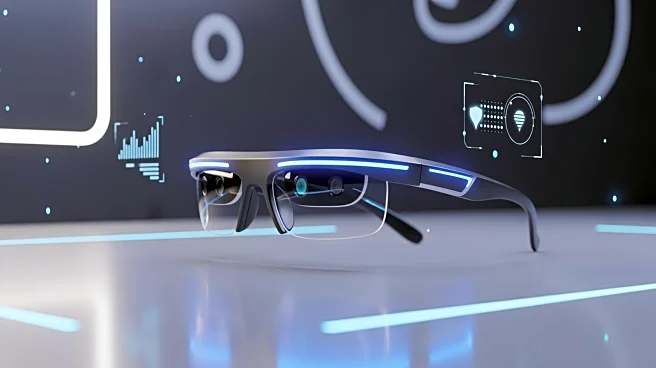What's Happening?
In 2025, several companies are launching new augmented reality (AR) products that are set to influence consumer choices and raise privacy concerns. Ray-Ban Meta released its second-generation AR glasses
in September 2025, priced at $379, which have improved battery and camera features. Snap has announced its consumer 'Specs' will arrive in 2026, positioning itself against Meta. Apple is developing specialized chips for future smart glasses, indicating a potential shift in the AR landscape. A startup founded by Harvard dropouts is introducing 'always-on' AI glasses, which have sparked privacy debates due to their ability to transcribe and augment conversations. Additionally, indie makers like Halliday are offering affordable AR frames, starting at $489, to compete with established brands. These developments highlight a growing trend in AR technology, with companies focusing on both consumer and enterprise applications.
Why It's Important?
The introduction of these AR products is significant for several reasons. For consumers, the availability of affordable and advanced AR glasses like Ray-Ban Meta and Halliday's frames provides more options and could drive wider adoption of AR technology. Snap's upcoming 'Specs' could attract younger buyers interested in social features, increasing competition in the market. Apple's investment in specialized chips suggests a future where AR devices become more integrated and standalone, potentially reshaping the tech industry. However, the 'always-on' AI glasses raise privacy concerns, as they could lead to increased surveillance and data collection, prompting discussions on regulation and ethical use. These developments could impact various stakeholders, including tech companies, consumers, and privacy advocates.
What's Next?
As these AR products enter the market, several outcomes are anticipated. Companies like Meta and Snap may intensify their competition, leading to more innovative features and pricing strategies. Apple's chip development could pave the way for new AR applications, encouraging developers to create more sophisticated AR experiences. Privacy concerns surrounding 'always-on' AI glasses may lead to regulatory scrutiny and potential changes in privacy laws. Consumers will likely evaluate the trade-offs between convenience and privacy, influencing their purchasing decisions. The growth of enterprise AR applications could also continue, offering productivity gains for businesses using AR for logistics and repairs.
Beyond the Headlines
The launch of these AR products could have deeper implications beyond immediate consumer and market impacts. The integration of AI into everyday devices like glasses may change social norms and interactions, as people become accustomed to constant data collection and augmented experiences. Ethical considerations regarding surveillance and data privacy will become increasingly important, potentially leading to new standards and practices in the tech industry. The shift towards more affordable AR options could democratize access to advanced technology, allowing smaller developers and creators to experiment and innovate in the AR space.









